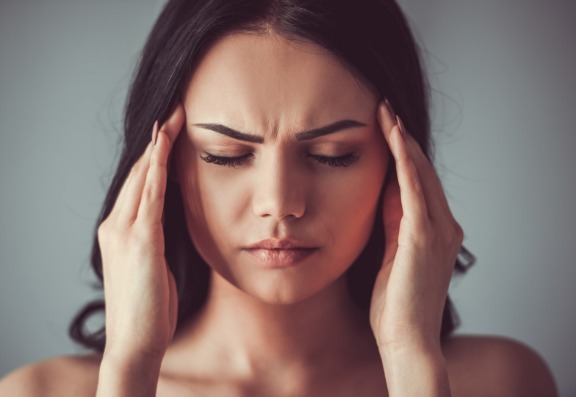A recent poll of over 1,000 women, who live in Surrey and the South East, has revealed that the majority believe stress and anxiety have aged them the most since turning 30.
Nearly 30% of participants cited stress and anxiety as having a detrimental impact on their looks, this was followed by lack of sleep at 21%, which is a well-known symptom of stress and anxiety.
How stress and anxiety can damage your skins health
The survey, conducted by our cosmetic medical clinic, health + aesthetics, based in Surrey, found that, despite studies regularly citing sun damage and smoking in particular as key causes of ageing, women still believe stress and anxiety have a much bigger impact on their skin.
Factors such as sun damage, smoking, and alcohol intake had just 13% of the results combined.

Yo-yo dieting can have a drastic effect on the skin
The Downside of ‘Having It All'
In the case of women in Surrey and the South East, ‘having it all’ could refer to ‘having all the anxiety', rather than balancing a career with motherhood. 18% of women surveyed chose ‘having children’ as the most significant impact on how they’ve aged. Anxiety and stress are a common side-effect of having children, with specific causes of stress including post-natal depression and the pressure and guilt that comes with being a working mum.
Having children can have a direct effect on sleep, with one study showing that we lose 44 nights’ worth of sleep in the first year of a baby’s life alone, so if women are anxious, tired and have children, they are experiencing three of the most common ageing factors identified by participants in the survey.
How Do Stress and Anxiety Impact Your Looks?
Frowning and a lack of sleep are two obvious side-effects that stress and anxiety can have on the skin. However, being in a constant state of stress can actually slow down the skin renewal process and cause us to produce more of the hormones that cause acne breakouts. Stress can also worsen existing skin conditions such as eczema and rosacea.
During periods of stress and anxiety, maintaining a healthy lifestyle can be difficult and poor diet and fitness can lead to problems with the skin. 15% of people surveyed chose poor diet and fitness as the key cause of ageing since they turned 30.
Not eating properly and not drinking enough water can rob the skin of moisture, as well as antioxidant vitamins such as vitamin A and C. Not exercising enough can make our circulation sluggish, causing a dull complexion.
Yo-yo dieting can have a drastic effect on the skin, with rapid weight gain and loss causing the skin to stretch and sag

How stress and anxiety effects skin ageing
Reducing the Impact Stress and Anxiety Has on the Skin With Cosmetic Treatments
Taking the time to look after ourselves is a key way to de-stress, with the added benefit that many pampering procedures in particular also help to improve the tone and texture of the skin.
One benefit of ageing is that once in our 30s, we’re likely to have established careers and be earning enough money to indulge in specialist beauty treatments to make us feel relaxed and pampered.
By making the choice to care for ourselves, we could actually improve our self-esteem
A common fear women have is that having a cosmetic procedure will make them look ‘over-done’, but suitable cosmetic treatments aim to make women look fresh and rejuvenated. It’s not about making someone 45 look 25 for example, it’s about educating women on the most appropriate treatments for them and supporting them in their goal to improve their skin and feel good about how they look.
Treatments that were once seen as ‘taboo’, such as Botox and dermal fillers, are now readily accepted as ways to improve skin texture and reduce wrinkles. Other treatments such as facials or skin peels can boost skin quality and leave you feeling rejuvenated, having spent some time being pampered and looked after.
By making the choice to care for ourselves, we could actually improve our self-esteem, which could result in reducing stress and anxiety and, according to one study, even improve our relationships and performance at work.

Author: Dr Rekha Tailor
Dr Rekha Tailor is the founder and Medical Director of Health & Aesthetics. She graduated from Manchester Medical School in 1989 and is a fully qualified General Practitioner and Medical Aesthetic Practitioner. She has worked in NHS hospitals and General Practice for numerous years before becoming a full-time Medical Aesthetic Practitioner in 2005.
She practices medicine in accordance with the GMC’s Good Medical practice Guidelines, overseeing all patient consultations and treatment planning.
Dr Tailor is one of the UK’s leading non-surgical cosmetic specialists, having combined her extensive clinical expertise and artistic flair to specialise in Aesthetic Medicine, and is known for her light touch and incredibly natural looking results.
She has received specialist training in the use and administration of all products and treatments offered by the clinic. She is a full member of the British College of Aesthetic Medicine (BCAM) and the Royal College of General Practitioners (RCGP).
To view more blogs by Dr Rekha Tailor please click here.
